The first woman to join the Kosovo Police close protection unit, Hikmete Imeraj’s karate skills and childhood on a farm shaped her into an iconic presidential security detail.
She’s often on the fringes of the media spotlight: a bright pop of platinum blonde moving swiftly through the crowds while closely following her target. Usually dressed in all black and with a deadpan expression on her chiseled, make-up free face, the former karate star is intimidating.
Hikmete Imeraj is perhaps Kosovo’s most recognizable policewoman, though she is sometimes confused as a personal bodyguard because she’s often shadowing former Kosovo president Atifete Jahjaga.
For the last ten years, Imeraj has constantly been by Jahjaga’s side in Kosovo and around the world.
Karate girl
Imeraj’s story begins in Uce, a small village in Istog, in northwest Kosovo. One of nine siblings, she was close to her father, Mehmet, who usually brought his young daughter to the fields to work.
“I liked to work with my father – I worked the land. Every job that I did in the village, I enjoyed. I helped my father with the cows by taking care of them,” said Imeraj, 40. “I did every job that a village man did.”
Life in Uce was difficult – and dangerous – especially in the 1990s when Kosovo Albanians lived under Serbian occupation. Albanian-language schools were closed by the ruling Serbian government, so Imeraj and her classmates were forced to study in improvised schools, usually in private homes.
On the morning of January 31, 1992, as she and her three cousins walked to a private house for classes about three kilometers away from her home, a group of Serb policemen patrolling the area stopped them. They asked the school children where they were going – they knew they were students despite the children’s efforts to hide their books under their jackets.
The children refused to disclose the location where the private classes were being held.
The policemen began to beat Imeraj and her classmates with rubber batons on their hands. A woman nearby saw the beatings from her kitchen window and reported it to her husband and other men having breakfast. The men rushed to the scene to help, pleading with the police to stop beating the innocent children. The children were somehow released and as Imeraj fled, she saw one of the policemen shoot one of the men in the face.
She would later find out that the three men who tried to save her and her classmates were killed. A documentary called Gjak mbi Abetare (Blood on the ABC-book) produced by RTK in 2009 featured Imeraj and was recently shown again on television on the 25th anniversary of the killings.
It was a moment in Imeraj’s life that has never left her mind.
Growing up, I worked hard in the village and I loved it.
Two years later, Imeraj left her family village and moved to Prishtina on her own. She enrolled at the University of Prishtina and fell in love with philosophy and sociology, especially with the works of Socrates and Kant.
“I think sociology is how you can work or connect with people. It helps me so much,” she said while sipping an espresso on a recent late evening after finishing up her shift with the former president, Atifete Jahjaga.
“Growing up, I worked hard in the village and I loved it. It helped me so much, it made me strong and made me understand many things, like people and how to help people.”
Studying philosophy and sociology, she said, “you learn how to listen to people, how to give advice, how to help them, and how to save yourself from people. It’s a great way for me and it has helped me so much for this job in security.”
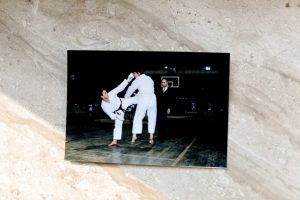
An old photo from the late 1990s shows a teenage Hikmete Imeraj competing in a karate fight.
She also trained in karate in between classes at the Prishtina Karate Club, sometimes twice a day.
“Karate helped me for my job,” Imeraj said. She and her teammates trained hard – early morning runs in Germia were common, even in the snow, along with training in abandoned buildings around Prishtina when they were not allowed to go to the Karate club because the Serbs had closed the facility.
Others in the club, especially the younger female students, looked up to Imeraj, especially after she became an instructor.
“She was very strong, the strongest girl in that club,” recalled Marigona Beadini, 31, a special forces policewoman who was 11 years old when she started going to the karate club and saw Imeraj for the first time.

The president of the karate federation in Kosovo presents Hikmete Imeraj with a medal in the late 1990s.
“I remember when I was small, [I asked myself]: can I grow up and be strong like Hikmete?”
Beadini ended up becoming a boxing champion in Kosovo and an instructor in Krav Maga, an intense self-combat and close combat technique developed for the Israel Defense Forces, for her special forces unit, which is mostly comprised of men.
By 1998, the security situation in Kosovo deteriorated. KLA guerrilla units, mainly in the Drenica region, would attack Serbian police and military units, which in turn would retaliate against the civilian population. For months on end, roads were blocked by police checkpoints.
Still, Imeraj, who was studying in Prishtina, said she felt she had a duty to go back home, continuing to travel to Uce as often as she could. When roads were closed, she traveled on perilous routes through northern Kosovo and neighboring Montenegro to return to her village.
It was rare for anyone, especially a young woman, to travel from Prishtina to remote villages during wartime. Imeraj recalls hardly seeing people out and about during the war in her Sunny Hill neighborhood in Prishtina, let alone traveling alone outside the city.
“I wasn’t afraid. I didn’t care for anything,” said Imeraj about taking those risky independent trips to see her family.
Some of her karate friends joined the KLA, and Imeraj claims that the martial art skills helped them and their fellow fighters. Nevertheless, some of her friends died in the war.
About a month after NATO launched a series of airstrikes in Kosovo in March 1999, Imeraj and two friends escaped to Macedonia, following the footsteps of nearly 800,000 Albanians. But unlike her fellow countrymen and women, she fled without her family.
According to Imeraj, she was on the last train leaving Prishtina in April 1999. She spent around three weeks in one of the refugee camps in Stankovic, then another month or two in a village in Tetova before returning to Kosovo.
Upon returning to Kosovo, she learned that while her mother, father and four brothers were in hiding in the mountains of Montenegro and Albania during the war, Serb security forces burned down her family’s home in Uce and most of their possessions were gone.
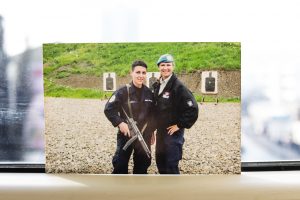
Hikmete Imeraj poses for a photo circa 2002 with a Canadian female instructor from UNMIK.
Finding her calling: the Kosovo Police
After graduating from university, Imeraj decided to stay in Prishtina. Sometime during the summer of 1999, one of her friends approached her and asked if she wanted to join the new police force.
“Are you kidding me?” Imeraj replied, laughing. Her friend gave her one of the four applications that she had with her.
Imeraj didn’t think much about it but filled it out anyway and dropped it off at a small window in a building in the center of Prishtina, which is still the current headquarters of the Kosovo Police.
Established after the war, the Kosovo Police was a brand new institution, recruiting fresh cadets to fill its ranks.
Shortly after dropping off her application, Imeraj was interviewed by international police advisors from the UN Mission in Kosovo, UNMIK, and by November, she was selected to start training at the Kosovo Police academy in Vushtrri.
“As a child, I loved [the idea of becoming a soldier]. I never thought about the police. Only to become a soldier,” said Imeraj, taking a stack of old photos from her jacket.
They are all photos of Imeraj as a young police cadet. One photo shows her standing next to Kosovo’s first president, Ibrahim Rugova, just after her graduation. In another photo, she is seen posing with other Kosovo Police officers from the close protection unit, CPU.
One thing stands out – she is the only woman in most of the photos.
“It was very difficult to finish,” she said about the rigorous CPU training. “At the time there were many women who wanted to join us, but they didn’t pass the test or the training because it was too hard.”
Imeraj was the 253rd person to join the Kosovo Police, a member of the force’s second cohort. She was also a first generation CPU operator, having joined in 2002 when the force started protecting Kosovo high officials. She was the first and only woman until 2008.
Imeraj recalls the challenges she faced while on foot patrol in the streets of a liberated Prishtina after graduating from Vushtrri in late 1999.
The most glaring one: Kosovo Albanians did not trust the police, or any person in law enforcement or military uniform for that matter. Under the oppressive Milosevic regime throughout the 1990s in Kosovo, Serb police routinely abused and terrorized – and in some cases, raped – innocent civilians. The distrust in the police was prevalent in postwar Kosovo where just the sighting of a police officer on patrol did not bode well for Kosovars.
“Changing the system was very difficult because when the citizens saw the uniform, they were terrified. We had to speak to them slowly and politely,” she said. “For Albanians in the first years, it was very difficult.”
Today the Kosovo Police and the Kosovo Security Force are the most trusted institutions in Kosovo, according to a 2016 report by the Kosovar Centre for Security Studies. Over the years, the Kosovo Police has also managed to instill trust among the Serb population in northern and southern Kosovo, as well as recruit more Serbs – especially from Serb-run Civilna Zastita (Civil Protection) – to join the force. Serbs and other minorities in Kosovo represent around 16 percent of the Kosovo Police.
Imeraj confesses that there have been times when it was difficult to be a woman in the Kosovo Police – as of 2015, women represent close to 14 percent of police force – but she always overcame the barriers.
“It was very difficult, especially because we had people from everywhere in Kosovo – from [rural and mountainous] villages – maybe some of them didn’t have enough schooling, didn’t have secondary school, didn’t have enough culture. And I had to work with them. But I survived,” she said.
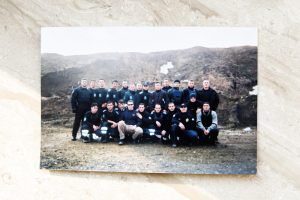
A photo from 2002 shows Hikmete Imeraj, bottom left, with her Close Protection Unit (CPU) colleagues and an American instructor. Until 2008, Imeraj was the only woman in the Kosovo Police’s CPU.
Her childhood in Uce helped her navigate her new life as a policewoman in a male dominated profession.
“I grew up with men,” she said. “I did a man’s work in the fields. I went with my father to the cafés. For me, it’s nothing. It’s nothing special.”
But still, some of her male colleagues had a problem with her. After Imeraj was chosen as one of the CPU instructors, she recalls that a fellow officer was surprised to have a female trainer and questioned her credentials.
Unruffled, she told him to not interrupt her or leave the class.
‘Ninja, you are crazy. You are stronger than all of these men!’
“It was hard but I never gave up,” she said adding that she believes more women will eventually join security forces. “I think everything in the world is possible if you love it and if you work hard.”
Imeraj describes another time when she and the other CPU colleagues – all male – had kickboxing training. Using a variety of real life combat techniques, the teammates fought “for real.”
One of the Albanian instructors, a former Kosovo Liberation Army fighter, wanted to fight with Imeraj. He had defeated all her male colleagues in about a minute.
“When I went in, I fought with him for real. He [fought with all of his might]. I didn’t care. And when he finished, he said: ‘Ninja, you are crazy. You are stronger than all of these men!’”
“Ninja” is the name Imeraj received from her karate days. The nickname stuck and almost all her police colleagues still call her that.
“Maybe some of them don’t know my [real] name. Just Ninja,” she said, laughing.

Hikmete Imeraj escorts President Jahjaga during a tour of the Wine and Grape Festival in Rahovec. | Photo: Valerie Plesch
Protecting the President
Imeraj’s work with former Kosovo President Atifete Jahjaga began in 2007, when Jahjaga was the deputy director general of the Kosovo Police.
Someone from Jahjaga’s office called Imeraj and said “Hey Ninja, come to our office. The General is calling you.” And she hung up.
Imeraj was taken aback by the surprise phone call; she thought she did something wrong.
When she arrived at Jahjaga’s office, the woman who had called Imeraj said Jahjaga requested that Imeraj work with her. She was given some time to think it over, but Imeraj replied that she didn’t need to mull it over, because she already knew Jahjaga.
“Everybody knew who she was. She was nice with people, helped many. In my mind, she was good. So I accepted,” Imeraj said.
For the next four years, Imeraj mainly served as Jahjaga’s dedicated driver.
“You do it with your heart and never stop. You want your country to be great.”
By the time Jahajga became Kosovo’s president in 2011, Kosovo’s CPU sent over a few operators as the president’s new security detail, including Imeraj.
During the five years of Jahjaga’s presidency, Imeraj became a constant presence, not only in Kosovo, but around the globe.
Easily recognizable by her shaved, whitish-blonde hairstyle – it was Jahjaga’s suggestion that Imeraj, a former brunette, dye her hair bleach blonde – Imeraj is also often seen lending her hand for non-police duties.
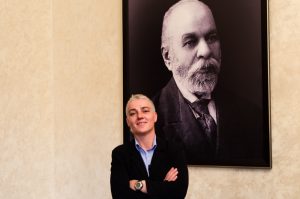
Hikmete Imeraj waits for President Jahjaga to finish a meeting at the Albanian Parliament in Tirana. President Jahjaga’s first state visit to Albania was in 2015. | Photo: Valerie Plesch
She was once spotted hanging dresses at the Thinking of You art installation at Prishtina’s football stadium while accompanying Jahjaga on a visit the day before the installation opened to the public. The aim of the installation was to pay tribute to survivors of sexual violence during the Kosovo war, one of the Jahjaga’s main initiatives as president.
And almost everywhere, Imeraj was seen taking photos of Jahjaga’s trips from all corners of the world – from Jordan to Senegal to Honduras to Texas – on her phone.
Why does she do all of this?
“I do it because she deserves it. She’s the only person who I see as working for our country, really with heart,” she replied.
Though Jahjaga’s mandate as president ended last April, Imeraj continues to provide security to Jahjaga. According to the Law on the President of the Republic of Kosovo, presidents are entitled to official escort for three years.
Last year, Imeraj was promoted to Sergeant after more than 16 years serving with the Kosovo Police and clocking more than 12,000 hours of overtime.
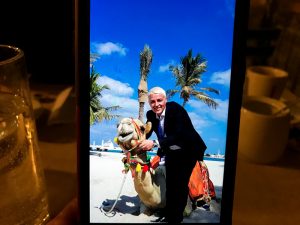
A photo from Hikmete Imeraj’s phone shows her posing with a camel in Abu Dhabi, UAE during one of President Jahjaga’s overseas trips.
Imeraj says she doesn’t have much of a personal life – she often spends any free time she has with her family, like her 23-year-old niece Diellza Hakaj.
“If you want to take an example of a good woman with a strong character, look at Hikmete,” Hakaj said about her aunt, who taught her how to drive on the back roads of Istog.
“When you work hard and you really want to do something, you have to leave something [behind],” Imeraj said having prioritized her career over her personal life.
Everything she does is for her country. “You do it with your heart and never stop,” she said with a determined look. “You want your country to be great.”





